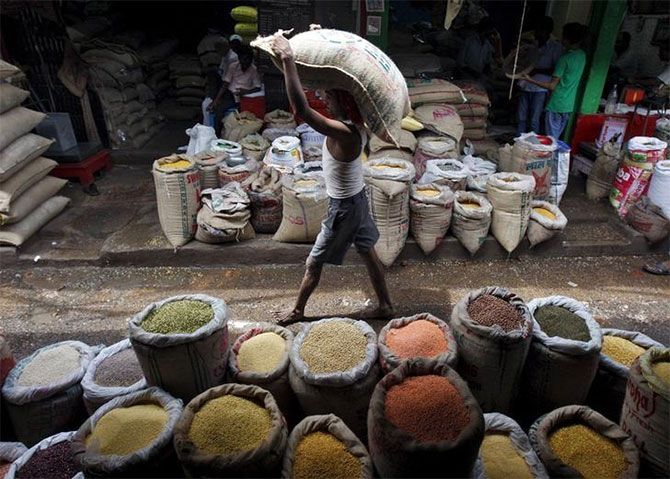 | « Back to article | Print this article |
To prevent hoarding and check price rise, the Centre on Friday imposed stock limits on all pulses, except moong, held by wholesalers, retailers, importers and millers till October.

The stock limits are imposed with immediate effect. An order in this regard has been issued by the Union food and consumer affairs ministry.
Retail prices of pulses rose by more than 20 per cent during the January-June period of this year, according to the ministry's data.
According to the ministry, the stock limit of 200 tonnes has been imposed on wholesalers provided they do not hold more than 200 tonnes of one variety of pulses.
For retailers, the stock limit will be 5 tonnes.
In the case of millers, the stock limit will be the last three months of production or 25 per cent of annual installed capacity, whichever is higher.
Lastly, for importers, the stock limit will be the same as that of wholesalers for stocks held/imported prior to May 15, 2021.
And for pulses imported after May 15, the stock limit applicable on wholesalers will apply after 45 days from the date of customs clearance, the order said.
If the stocks of entities exceed the prescribed limits, they have to be declared on the online portal (fcainfoweb.nic.in) of the Department of Consumer Affairs and have to be brought within the prescribed limit within 30 days of the notification of this order, it added.
According to the ministry, there was a sustained increase in the price of pulses in March-April.
The need for an urgent policy decision was felt to send the right signal to the market.
Retail prices of tur and urad dal have increased to Rs 110/kg each now from Rs 100/kg in January, the ministry data showed.
Masoor dal rates have risen by 21 per cent to Rs 85/kg now from Rs 70/kg, while that of gram dal to Rs 75/kg from Rs 65/kg in the said period.
To enable real-time monitoring of the price of pulses, the ministry said a web portal has been developed to keep a check on the undesirable practice of hoarding.
Among other measures taken to control the prices of pulses, the government has allowed free import of tur, urad and moong till October, shifting them from the restricted category.
Even the time taken for clearing consignments has been reduced to 6.9 days from 10 to 11 days in the case of pulses and 3.4 days in the case of edible oils.
Additionally, five-year MoUs have been signed with Myanmar, Malawi and Mozambique for the import of pulses.
The agreement with Myanmar is for annual import of 2.5 lakh tonne of urad and 1 lakh tonne of tur, while with Malawi for annual import of 1 lakh tonne of tur, and with Mozambique annual import of 2 lakh tonne of tur being extended by another five years.
"These MoUs will ensure predictability in the quantity of pulses being produced abroad and exported to India, thus benefiting both India and the pulse exporting country," the ministry said.
To cool down prices of pulses, the Centre released buffer stock of pulses in 2020-21 to state governments by bearing the cost of milling, processing, transportation, packaging and service charge.
Moong, urad and tur dal were offered to the states and union territories for supply through retail outlets such as Fair Price Shops, Consumer Cooperative Society outlets, etc.
About 2 lakh tonnes of tur dal were disposed of through the open market to check prices between October 2020 and January 2021.
Further, pulses like tur and chana were also supplied for welfare and nutrition programmes at the support price.
The country's pulses production was 25.58 million tonnes in the 2020-21 crop year (July-June).
The government aims to create a higher buffer of pulses at 23 lakh tonne this year under the price stabilisation fund scheme.
The government has also taken several measures to control prices of edible oils, including a reduction in import duty of crude palm oils and refined palm oils till September.
Photograph: Rupak De Chowdhuri/Reuters